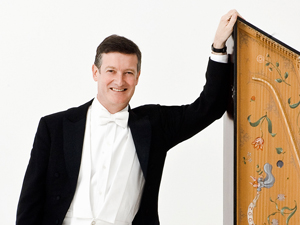by Daniel Hathaway

Leading a reduced orchestra of 23 strings from a German harpsichord borrowed from the Cleveland Museum of Art, Bicket began the evening with Handel’s 11th Concerto Grosso from Op. 6, an A-major work refashioned from the Organ Concerto Op. 7, No. 2. His elegant, nuanced reading of the piece featured sensitive playing from the solo trio of violinists William Preucil and Stephen Rose and cellist Mark Kosower.
At the other end of the concert came Handel’s Music for the Royal Fireworks. Here, Bicket summoned sonic brilliance from an indoor orchestra of strings, oboes, bassoons, horns, trumpet, and drums (the original, outdoor version called for a vast band of oboes and bassoons and, at the behest of the King, no fiddles). Sharply-dotted rhythms gave royal grandeur to the slow opening of the Overture, and brisk tempos enlivened its Allegro.
The succeeding dance movements (Bourrée, La Réjouissance, and two Minuets) were underlined by the pleasant, subterranean growl of the contrabassoon (Jonathan Sherwin), and the intervening “La Paix” was lushly pastoral.
The other British suite on the program drew on Henry Purcell’s incidental music for the masque King Arthur. As adept at theater music as he was at ceremonial music (the composer finished his brief career as organist of Westminster Abbey), Purcell supplied a rich succession of delicious tunes to go with John Dryden’s libretto. Bicket drew responsive and stylish playing from the ensemble of strings, oboes, bassoons, trumpets, and timpani. Particularly attractive were Purcell’s variations on a ground bass in the Chaconne.
Bicket programmed Jean-Philippe Rameau’s suite from Les Boréades in the middle of Saturday’s concert, a work that fielded the evening’s largest ensemble: strings, flutes, piccolos, oboes, clarinets, bassoons, horns, timpani, and percussion. In addition to playing drum and tambourine, percussionist Donald Miller also took a turn at the wind machine — a wonderful contraption that produces its effect by moving a slatted cylinder against canvas. Since Rameau’s opera is about the god of the north wind, the machine came into prominent use during the “Suite of the Winds,” where Miller conjured up a proper Nor’easter.
The Rameau provided a fine contrast to the British works with its Gallic orchestral colors, gorgeous melodic sequences, and dialogues between strings and winds. Bicket expertly teased out its delights and played with its nuances, finally producing a thrilling accelerando to bring the suite to a conclusion.
Harry Bicket is the latest in a series of period instrument specialists to lead The Cleveland Orchestra in music the ensemble is not accustomed to performing. (Of Saturday’s repertoire, the Fireworks music is the only work the Orchestra has programmed before.) On Saturday, he drew uncommonly penetrating performances of Baroque music from modern instrumentalists. May he be invited back soon for more of the same.
Published on ClevelandClassical.com April 5, 2017.
Click here for a printable copy of this article


